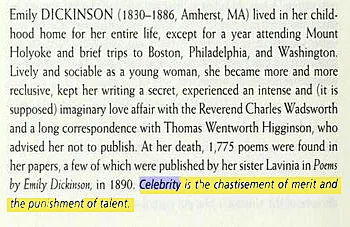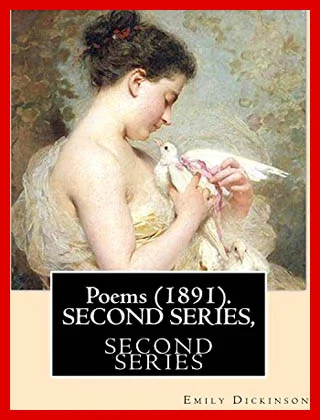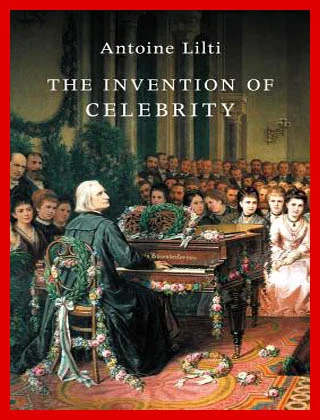Do you know the quote celebrity is the chastisement of merit is not by Emily Dickinson?
Yes, I am referring to the quote:
Celebrity is the chastisement of merit and the punishment of talent
This line is most probably NOT by the 19th-century American poet Emily Dickinson.
From my own findings, I did come across the line from the book “Good Poems For Hard Times” by Garrison Keillor.
The line “Celebrity is the chastisement of merit and the punishment of talent” just mentioned at the end of the short biography of Emily Dickinson.
(Good Poems For Hard Times Selected And Introduced By Garrison Keillor, Viking, 2005, Biographies, P. 306) source
 Here is another link from Google Books site.
Here is another link from Google Books site.
It is not from Emily Dickinson’s poem “To fight aloud, is very brave” in this book on page 129.
I went through these two books of poems by American poet Emily Dickinson, and I still cannot locate this line, “Celebrity is the chastisement of merit and the punishment of talent”.
These are the two books:
The Complete Poems Of Emily Dickinson, Edited By Thomas H. Johnson, Boston/Toronto: Little, Brown And Company, 1890
Poems By Emily Dickinson, Edited By Two Of Her Friends Mabel Loomis Todd And T. W. Higginson, Boston: Robert Brothers, 1890
I have also gone through many of Emily Dickinson’s letters, and this line is still not in sight.
Many websites and books attributed this quote to Emily Dickinson, but none of them has cited the source.
This quote is also attributed to Emily Dickinson in Your Dictionary site, and again without citation.
“Celebrity is the chastisement of merit and the punishment of talent.” is by the French writer Sébastien-Roch Nicolas de Chamfort or just Nicolas Chamfort.
Nicolas Chamfort is best known for for his epigrams and aphorisms.
This particular quote written in its original French language is:
La célébrité est le châtiment du mérite et la punition du talent
(Maximes Et Pensées; Suivies De Dialogues Philosophiques; Text Revu Sur L’édition Originale Et Publié Avec Des Notes Et Un Index Par Ad. Van Bever, Paris: Les Éditions G. Grés & Cie, 1923, CCCXXXIII, P. 116 ) source
(The quote in French is also found here and here.)
For the English translation, “Celebrity is the chastisement of merit and the punishment of talent” is found in:
(A Thousand Flashes of French Wit, Wisdom, and Wickedness Collected And Translated By J. De Finod, New York: D. Appleton and Company, 1881, P. 186) source
Franz Liszt quoted Chamfort Maxim
The famous Austrian piano virtuoso Franz Liszt quoted this Chamfort maxim in his letter, which he wrote to Madame Jessie Laussot (ex-lover of Richard Wagner):
“Only at certain moments I fancy that judicious maxim of Chamfort is somewhat applicable to me: “Celebrity is the punishment of talent and the chastisement of merit”.
(Letters Of Franz Liszt, Collected And Edited By La Mara, Translated By Constance Bache, Vol. II: From Rome To The End, London: H. Grevel Co., 1894, 37. To Madame Jessie Laussot, March 6th, 1865, P. 97) source
NOTE: Listz had reversed the quote.
Celebrity is the chastisement of merit not by Emily Dickinson
This is another quote about celebrity, and again is NOT by Emily Dickinson.
It is another genuine Nicholas Chamfort quote:
“Celebrity is the advantage of being known to people who we don’t know, and who don’t know us.” – Nicola Chamfort
“Célébrité: l’avantage d’être connu de ceux que vous ne connoissez pas.” (French)
(The quote in French is found in: Oeuvres Complètes De Chamfort, Troisiéme Édition, Tome Second, A. Paris, Chez Maradan, Libraire, 1812, Maximes Et Pensées, P. 26) source
Talking about celebrity, many of you think the phenomenon of celebrity is something of a modern culture.
According to this book “The Invention of Celebrity” by Antoine Lilti, it goes back way back in Europe during the Enlightenment.
And then flourished during the Romantic period on both sides of the Atlantic.
In this book, it also mentioned about Nicolas Chamfort and both his well-known wry aphorisms:
“Celebrity is the chastisement of merit and the punishment of talent.”
“Celebrity is the advantage of being known by those who do not know you.”
“Célébrité: l’avantage dêtre connu de ceux que vous ne connaissez pas.” (French)
(The Cynic’s Breviary; Maxims And Anecdotes From Nicolas De Chamfort, Selected And Translated By William G. Hutchison, London: Elkin Mathews, 902, P. 25) source
(The quote in French is found in: Chamfort: Pensées, Maximes, Anecdotes, Maximes Et Pensées, Avec Etude Sur La Vie Et L’oeuvre De Chamfort, Par Charles Simond, Il Parait Un Volume Par Semaine, Paris: Henri Gauntier, 1889, Maximes Et Pensées, I Maximes Générales, P. 10) source
You can read all about it from this book below.
The Invention of Celebrity by Antoine Lilti
By the way, do you know libertine Nicolas Chamfort was a cult figure in the salons of pre-revolutionary Paris.
But it was only after his death (suicide), in April 1794, at the age of 53, he achieved the fame he had always longed for.
This is said to be his last sarcastic quote:
“Ah! my friend! And so I leave this world, where the heart must either break or turn to bronze.” – Nicola Chamfort
“Ah ! mon ami ! dit-il en expirant, je m’en vais enfin de ce monde, où il faut que le cœur se brise ou se bronze.” (French)
(The quote in French is found in: Du suicide Et De La Folie Suicide Considérés Dans Leurs Rapports Avec La Médecine, Et La Philosophine Par Alexandre Jacques F. Brierre De Boismon, Paris: Germer Bailliére, Libraire-Éditeur, 1856, P. 310) source
(The quote in French is also found here.)
It was said that after the passing of this France’s forgotten philosopher, they found in his room strewn with thousands of scraps of paper with his writings.
They are his reflections on love, life, and society.
It was Nicolas Chamfort fans who later gathered and published them into a book, titled “Reflections On Life, Love And Society Together With Anecdotes And Little Philosophical Dialogues”.
Nicolas Chamfort is also known for this contemptuous epigram:
“What I learned I no longer know; the little I still know, I guessed.” – Nicolas Chamfort
“Ce que j’ai appris je ne le sais plus; le peu que je sais encore, je l’ai deviné.” (French)
(The quote in French is found in: Oeuvres Complètes De Chamfort, Troisiéme Édition, Tome Second, A. Paris, Chez Maradan, Libraire, 1812, Maximes Et Pensées, P. 67) source
This is another one of his many witty epigrams:
“The most wasted day of all is that on which we have not laughed.” – Nicholas Chamfort
(Bartlett’s Familiar Quotations By John Bartlett, Geoffrey O’Brien, UK: Hachette, 2014, Sébastien Roch Nicolas Chamfort, P. CXCIII) source
The original line written in French is:
“La plus perdue de toutes les journées est celle où l’on n’a pas ri.”
(Maximes Et Pensées; Suivies De Dialogues Philosophiques; Text Revu Sur L’édition Originale Et Publié Avec Des Notes Et Un Index Par Ad. Van Bever, Paris: Les Éditions G. Grés & Cie, 1923, LXXX, P. 28) source
So remember, celebrity is the chastisement of merit not by Emily Dickinson.
This celebrity is the chastisement of merit and the punishment of talent quote is by Sébastien-Roch Nicolas de Chamfort or just Nicolas Chamfort.



